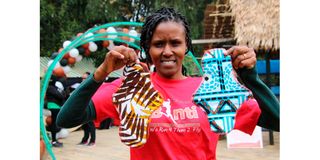Laikipia group sustaining girls’ hygiene with free reusable pads

Ann Muriuki, founder member of Binti Mwangaza displays a reusable sanitary towel during an event to mark 10 years since the inception of their programme on July 9, 2022.
What you need to know:
- Ann Muriuki, has joined hands with 15 other women in Nanyuki to manufacture and distribute reusable sanitary towels to schools in Laikipia County.
- Since 2012, they have manufactured more than 30,000 reusable towels, which have been donated to more than 5,000 girls in Laikipia.
Most teenage girls in Laikipia County have fallen into the trap of sex predators due to lack of sanitary towels, leading to a rise in early pregnancies and marriages.
Some have contracted Sexual Transmitted Infections (STIs) as sex pests lure them into the vice in exchange for sanitary towels.
Statistics from the Laikipia Health Service (LHS) show that 15,015 girls aged between 10 and 19 years have conceived in the last three years, and are now young mothers.
Of these cases, 5,506 were reported in 2019, 5,489 in 2020 and 4,020 in 2021.
One woman, Ann Muriuki, has joined hands with 15 other women in Nanyuki to manufacture and distribute reusable sanitary towels to schools in the county.
Vulnerable girls
Ms Muriuki formed Binti Mwangaza, a community-based organization (CBO) to help girls through mentorship programmes on menstrual hygiene and availing the sanitary pads to them. Members of the organization manufacture the sanitary towels at their workshop in Nanyuki town and donate them to vulnerable school-going girls, for free.
Binti Mwangaza has, since its inception in 2012, manufactured more than 30,000 reusable sanitary towels, which have been donated to more than 5,000 girls in Laikipia. The organization also offers menstrual hygiene sensitisation to members of the community at the grassroots.
“Majority of the girls cannot afford sanitary towels and are forced to give sexual favours to get the items. When a girl has a reusable towel, there is no way she would exchange her body to get money to purchase them at the shop,” says Ms Muriuki.
“There is always a thread and a needle in an African house. One can easily manufacture the pads using cotton materials. These girls live in the same houses with their brothers, uncles and fathers even when they are in their menses. That is why we reach out to all members of the community,” she adds.

Ms Muriuki is the founder member of Binti Mwangaza, which also trains young girls and women how to make reusable pads at home.
Ms Muriuki says the reusable pads are meant to ensure a steady enrolment of girls to school and consistency throughout their learning programme.
“The idea of Binti Mwangaza is to ensure our young girls in Laikipia consistently attend school to completion without encountering challenges of menses. This is a unique way of minimizing cases of school dropouts,” Ms Muriuki says.
They also train young girls and women in the cosmopolitan county on how to manufacture the pads.
“We train young girls and women to manufacture the items because the materials are locally available. They just need cotton clothes, which they then sew using a thread and a needle,” Ms Muriuki adds.
Their other programme dubbed ‘hold my hand’, involves eight registered women groups who are trained on how to venture into value addition and generate income. Each group has 30 members.
The young women – drawn from Laikipia East, Laikipia North and Laikipia West constituencies – are impacted with skills on how to manufacture mango jam, marmalade and chutney.
“Majority of the women are illiterate but we have empowered them to venture into sustainable businesses. Our aim is to eradicate the handout mentality that has greatly entrenched in our different communities,” Ms Muriuki says.
HIV patients
Laikipia has experienced a steady rise in cases of HIV and STIs, the Laikipia County Statistical Abstract 2020 report shows.
The data, which was extracted from the county department of Health, shows that STIs rose from 3,581 in 2017, 4,434 in 2018 to 5,037 in 2019. Laikipia West Constituency has been on the forefront with a record of 1,846 to 2,103 and 3,224 in the three respective years.
The outpatient morbidity for patients aged five years and above shows that the newly diagnosed HIV patients hiked from 146 in 2017, 193 in 2018 to 216 in 2019. The constituency has taken the lead with 85, 105 and 138 new patients in the consecutive years.
This was coupled by a decline in the number of men using condoms as contraceptives as stipulated in the report.
The report shows that the number of ‘clients receiving male condoms’ stood at 5,273 in 2019 compared to 5,647 in 2018. Compared with other constituencies, Laikipia North recorded a decrease in usage of the contraceptive from 2,299 males in 2018 to 1,829 in 2019.
Sex with minor is a crime in Kenya and attracts a jail term ranging from 15 years to life imprisonment upon conviction.
A 2019 report compiled by the National Council on Population and Development, indicated that 20,828 girls who had conceived were aged between 10 and 14 years, while 349,365 were aged 15 to 19 years.





